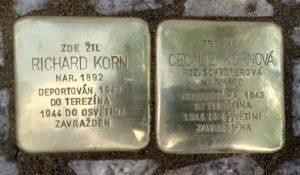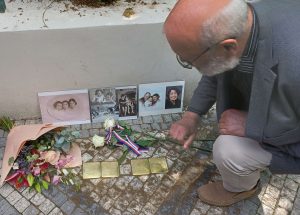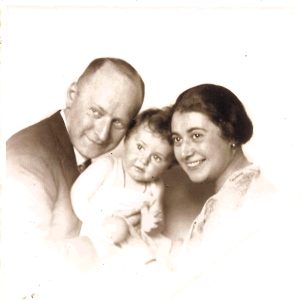 Address: LONDÝNSKÁ 596/28, PRAGUE 2
Address: LONDÝNSKÁ 596/28, PRAGUE 2
Born 28. 01. 1899
Last residence before deportation: Prague XII
Address/place of registration in the Protectorate: Prague II, U Slepé brány 4
Transport Di, no. 498 (13. 07. 1943, Prague -> Terezín)
Transport Eo, no. 1345 (06. 10. 1944, Terezín -> Auschwitz)
Murdered
 Mariana and parents
Mariana and parents
The Korn Family
The Korn family (father Richard, mother Cecilie, and daughters Vera and Mariana) were a Czech Jewish family from Ostrava. They had a happy life together, full of art, music and nature,
that was cruelly and tragically cut short. Some of their favorite family pastimes were attending opera at one of Ostrava’s two opera houses, and taking vacations to the Tatra mountains in
Slovakia.
Cecilie Kornova (nee Schroterova) was also born in Ostrava, in 1899. She was remarkable for a woman of her time in that she had both an education and a career, using her skills as the
bookkeeper of the family shoe store. She came from a large, warm family herself, with two sisters, and a younger half-brother. Her father, Marcus, had a dry goods store in Ostrava, and a
telephone – a rare modern amenity that delighted the children. As her daughter Vera recalls, she was a highly rational, understanding and warm mother, and passed on to her children a love
of art and nature.
In 1939, the Nazis seized Ostrava, confiscated the family shoe store, and briefly detained Richard and Cecilie, after which the family relocated to Prague. Richard and Cecilie did their
best to recreate a sense of normalcy at their apartment in the Vinohrady neighborhood, but this became increasingly difficult. The children were only allowed one more year of school, before
this and many other rights were taken away. Richard and Cecilie made plans to emigrate to Chile but, after many delays, these plans were never realized. In 1943, the family was deported
to Terezin. In 1944, they were deported to Auschwitz, where Richard, Cecilie and Mariana were murdered.
What we know about Richard, Cecilie, and Mariana is largely thanks to Vera (born 1927) who survived the war, and in whom their spirit lives on to this day. Vera was held at Auschwitz for two
weeks, but then transported to the Birnbaumel labor camp. She escaped with a friend during the westward relocation of the camp (a “death march”) in 1945. After the war, she returned to
Prague, where she enrolled in art school and searched for news of her family’s fate, which never came. In anticipation of the Soviet takeover, she emigrated to England, where she met and
eventually married Alexander Bondy, a fellow Czech Jew whose family had escaped from Prague before the war broke out. Together they relocated to Montreal, Canada in 1953, where
they found a free, unspoiled country and together started a new life. They had twin boys, who have gone on to have happy lives and families of their own. One was named Richard, after his
grandfather, and the other Thomas, after the great helmsman of the independent Czechoslovakia and friend to the Jews, Tomas Masaryk.
Vera says of Richard, Cecilie and Mariana that “their love sustained me and their moral guidance gave me strength through all the difficulties I have had. I always tried to live my life in
the way I know they would have wanted me to live.” In 1994, for the 50th anniversary of their deportation to Auschwitz, Vera arranged a burial service for Richard, Cecilie and Mariana, at the
Baron de Hirsch cemetery in Montreal. Now, in 2025, their descendants are pleased to install “Stolpersteine,” memorial stones, to keep their memories alive.
